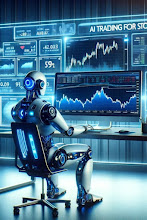Artificial Intelligence (AI) has emerged as one of the most transformative technologies of the 21st century. It refers to the simulation of human intelligence in machines programmed to think, learn, and make decisions. From autonomous vehicles to virtual assistants, AI is reshaping industries and redefining the boundaries of what machines can achieve.
In this article, we will explore the origins, applications, benefits, challenges, and future of artificial intelligence.
Atificial Intelligence (AI) is the creation of intelligent machines that can think, learn, and make decisions. It mimics human intelligence using algorithms and vast data processing capabilities, revolutionizing industries worldwide.
AI originated in the mid-20th century with concepts like Alan Turing’s "Turing Test," which questioned whether machines could exhibit human-like intelligence. Since then, advancements in computing power have made AI a practical reality.
Applications of AI
- Healthcare: AI helps diagnose diseases, predict outcomes, and personalize treatments.
- Education: Personalized learning and virtual tutors enhance education accessibility.
- Transportation: Self-driving cars and AI traffic systems reduce accidents and congestion.
- Business: AI automates tasks, analyzes data, and powers chatbots for customer service.
- Entertainment: Streaming platforms and AI-generated content improve user experiences.
Benefits
AI increases efficiency, reduces errors, and saves costs while fostering innovation in fields like science, medicine, and technology.
Challenges
AI raises ethical concerns, such as bias in algorithms, data privacy, job displacement, and accountability in decision-making.
Future Prospects
The future of AI includes advancements in General AI, ethical AI development, and sustainable solutions to global challenges like climate change.
Artificial Intelligence: Revolutionizing the WorldArtificial Intelligence (AI) is transforming the way we live, work, and interact. It refers to the development of machines and systems capable of performing tasks that typically require human intelligence, such as problem-solving, decision-making, and learning from experience. As one of the most revolutionary technologies of the 21st century, AI is reshaping industries, unlocking new possibilities, and presenting unique challenges.
AI encompasses a wide range of technologies, including machine learning, natural language processing, robotics, and computer vision. These technologies enable machines to mimic human capabilities such as understanding speech, recognizing images, and making predictions based on data. AI systems can be categorized into two types:
- Narrow AI: Designed for specific tasks (e.g., voice assistants like Siri and Alexa).
- General AI: A theoretical concept where machines possess human-like intelligence and can perform any intellectual task.
Applications of Artificial Intelligence
AI is revolutionizing multiple sectors, including:
Healthcare: AI-powered tools assist in diagnosing diseases, analyzing medical images, and predicting patient outcomes. For instance, AI algorithms can detect cancer in its early stages with remarkable accuracy.
Education: Personalized learning platforms use AI to adapt lessons to individual students’ needs, making education more accessible and effective.
Transportation: Self-driving cars and AI-based traffic management systems improve road safety and reduce congestion.
Business and Finance: AI streamlines operations by automating repetitive tasks, detecting fraud, and providing data-driven insights.
Entertainment: AI enhances user experiences on streaming platforms by recommending personalized content and even creating music, art, and stories.
Agriculture: AI tools optimize farming processes, monitor crop health, and predict weather patterns, boosting productivity.
- Efficiency: AI performs tasks faster and more accurately than humans, saving time and resources.
- Innovation: AI drives innovation by solving complex problems and enabling breakthroughs in science and technology.
- Cost Reduction: By automating routine tasks, businesses save money and focus on strategic initiatives.
- Improved Decision-Making: AI analyzes massive datasets to provide insights, aiding in smarter and more informed decisions.
Challenges and Concerns
Despite its potential, AI poses significant challenges:
- Ethical Issues: Biased algorithms can lead to unfair decisions, while data privacy concerns grow as AI relies on large datasets.
- Job Displacement: Automation risks replacing human workers in certain sectors, leading to unemployment.
- Security Risks: AI-powered systems are vulnerable to cyberattacks and misuse.
- Accountability: Questions arise about who is responsible for AI decisions, especially in critical areas like healthcare and law enforcement.
The future of AI is promising, with advancements in areas like quantum computing, robotics, and ethical AI frameworks. Emerging trends include:
- General AI: Machines capable of performing diverse tasks like humans.
- Sustainable AI: Addressing global challenges such as climate change by optimizing energy use and monitoring environmental conditions.
- Ethical AI: Developing fair, unbiased, and transparent systems to ensure responsible use.
Conclusion
Artificial Intelligence is more than just a technology; it’s a revolution that is reshaping the future. While it holds immense potential to solve complex problems and improve lives, its development must be guided by ethical considerations to minimize risks. By balancing innovation with responsibility, AI can unlock endless possibilities for a better and more equitable world.

%20on%20Mixed%20Reality%20(MR).jpeg)



Comments
Post a Comment